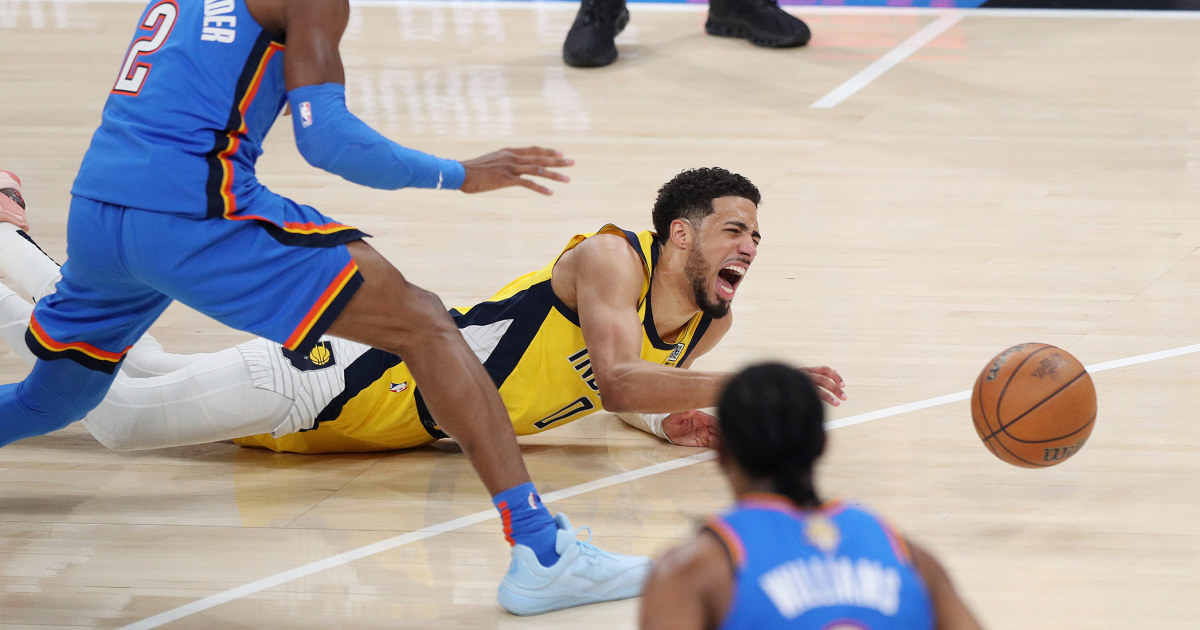Pacers star Tyrese Haliburton left Game 7 of the NBA Finals with an injury

Indiana Pacers guard Tyrese Haliburton left Game 7 of the NBA Finals in the first quarter with a right leg injury.
The Pacers announced during the second quarter that Haliburton would not return with what they called “a lower right leg injury,” per the ABC broadcast.
After he received a pass near the top of the key, Haliburton began to dribble before he collapsed to the floor as he lost control of the ball. He repeatedly slammed the court in agony before a timeout.
Follow along for live coverage of Game 7
He was taken off the floor with the help of teammates without putting any pressure on his right leg.
Haliburton was off to a hot start before the injury. He scored nine points in seven minutes, shooting 3-of-4 from 3-point range.
In Indiana’s 22 playoff games entering Sunday, Haliburton was averaging 17.7 points, 9 assists and 5.6 rebounds per game. He has been a major catalyst for the Pacers’ postseason success, leading multiple comebacks through the four rounds.
In Game 1 of the Finals, he hit the game-winning shot with 0.3 seconds left.
Haliburton had been playing through the last two games of the series with a right calf strain. He was observed limping earlier in the series, then appeared to aggravate the calf in Game 5.
“I’m pretty much in the same standpoint I was before Game 6,” Haliburton said the day before Game 7. “A little stiff, a little sore, rather. Good thing I only had to play, like, 23 minutes. I’ve been able to get even more treatment and do more things. Just trying to take care of it the best I can.”
After Game 6, which the Pacers won 108-91 to avoid elimination, Haliburton said that as long as he could walk, he would play.
“I just look at it as I want to be out there to compete with my brothers. These are guys that I’m willing to go to war with, and we’ve had such a special year, and we have a special bond as a group, and you know, I think I’d beat myself up if I didn’t give it a chance,” Haliburton said.
“I just want to be out there and fight and just had to have an honest conversation with Coach that, you know, if I didn’t look like myself and was hurting the team, like, sit me down. Obviously, I want to be on the floor. But I want to win more than anything.”
🔮 Fortellr Predicts
Confidence: 85%
The abrupt exit of Tyrese Haliburton from Game 7 of the NBA Finals due to a right leg injury is poised to have substantial ramifications for both the immediate game outcome and the broader strategic outlook for the Indiana Pacers. Notably, Haliburton's absence disrupts the Pacers' offensive rhythm and strategic depth, as his playmaking abilities and scoring have been pivotal throughout their playoff run. Historically, the loss of a key player often places increased pressure on remaining team members to compensate, potentially leading to strategic recalibrations by both coaches and players. The loss could see the Pacers employ a more spread offense, leaning heavily on secondary players who must step up to fill the void. Significant psychological reliance on Haliburton might compound the on-court challenges as players adjust to his void. Expect a tactical adjustment from the coaching staff, potentially involving increased focus on defensive tenacity to counterbalance scoring deficits. Moreover, the injury might instigate a more cautious approach to player injuries in similar contexts, prompting teams across the league to revise their assessments of playing injured players in high-stakes games. The systemic implications could involve a reevaluation of player health and game-time decisions in the NBA, especially during critical playoff games. Overall, the immediate and long-term impact of this injury extends beyond mere game outcomes, potentially appeasing or agitating stakeholder opinions among fans, management, and the broader sports community. Further ripple effects might include increased scrutiny on player welfare and injury management protocols, especially if the Pacers lose the Finals, which would likely spark discussions about the role of resilience versus reckless endangerment in professional sports.